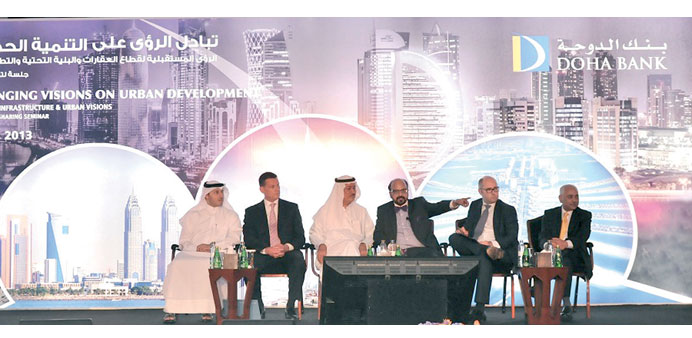(From left) Meshal al-Shamari, Charles Bott, Ed Senior, Dr R Seetharaman, Ganesh Mohan and Massoud Bafti during the Abu Dhabi summit.
Doha Bank, which operates full branches in Abu Dhabi and Dubai, has hosted the final round of its series of GCC summits on Real Estate, Infrastructure and Urban Planning.
The event, held in Dubai on May 21 and Abu Dhabi on May 22, brought together some of the region’s leading consultants and advisory firms to discuss opportunities and trends in the UAE’s real estate, construction and infrastructure development sectors.
The presenters were from Qatar Green Building Council (QGBC), Damac Properties, Morgan Stanley, KEO, PKF-TCH Group and the The Boston Consulting Group.
Doha Bank Group CEO Dr R Seetharaman delivered the inaugural address by setting the stage with a global economic overview. “In April, the IMF said it was lowering its outlook for world economic growth this year to 3.3%, down from its forecast in January of 3.5%. US economic growth is expected at around 1.9% this year, down from its January estimate of 2.1%. It also expects that the combined economy of the 17 eurozone countries will shrink by 0.3% in 2013. Sluggish global economic recovery, increasing energy production in the US and slightly slower growth in China had put pressure on oil prices recently. Gold prices had also fallen,” he said.
Dr Seetharaman then highlighted the trends impacting projects and infrastructure development in the UAE: “The UAE is undergoing stabilisation and has resurged from the property bubble, supported by tighter controls and more cautious optimism in the market. The IMF said this week it is not worried about Dubai’s ability to meet its financial obligations, boosting confidence in many sectors. It also added that the emirate’s economic growth may accelerate to 4% this year as the construction and logistics industries revive.
“A clear indication of the success of the UAE’s strategy can be seen in the Dubai Land Department’s impressive statistics for the first quarter of 2013, which show 63% growth in the total value of transactions made, reaching Dh44bn, with the number of transactions carried out totalling 14,260 — at a rate of 223 per day and 32 per hour, which is phenomenal. According to the data, sales transactions reached 10,913 for a total value of Dh24bn, with mortgages accounting for a large proportion of Dh17.8bn. Total land transactions made by the Land Department reached Dh28bn, with commercial land transactions achieving the highest value in terms of type of sub-land property by 37% of the total, while the total value of mortgages reached the highest level (54%) in terms of transactions made (986) worth Dh15bn.The total value of residential unit transactions made equalled Dh13.9bn during the first quarter, with sales transactions constituting 82.4% of the total number valued at Dh11.4bn,” he explained.
“By the end of 2011 leading up to the first quarter of 2013, the UAE’s key segments such as hospitality and infrastructure — in addition to plans to add commercial and residential square footage — have been registering positive numbers. The UAE Central Bank said in March this year that it aims to implement a first home mortgage loan to value ratio of 80% for nationals and 75% for expatriates with a tighter sliding scale of subsequent mortgage caps at 65% for nationals and 60% for expatriates seeking a second or third home. This is a positive measure that will help ensure future property market stability. This, coupled with strong government programmes to support the market, is expected to be core platforms for the UAE’s property sector,” he said.
Highlighting the business case for adopting green building standards, QGBC director Meshal al-Shamari said: “Globally, governments are increasingly focused on measures to save energy and protect the environment. In the UAE, the pace of infrastructure development is among the fastest anywhere in the world, and recently, a number of initiatives have been undertaken by regional authorities and industry leaders to improve the efficiency of buildings.”
He also said green construction does not necessarily cost more. “There is an overall trend of reduction in design and building costs as markets mature. Upfront costs are often offset by a decrease in long-term life cycle costs.”
Al-Shamari said sustainability risk factors can affect rental income and the future value of real estate assets, in turn affecting their return on investment.
The speakers also included Ed Senior, vice-president in Morgan Stanley’s Global Capital Markets Group; Hussain Sajwani, founder and chairman of the Damac Group; Charles Bott, business development director at PKF; Massoud Bafti, senior member of KEO’s PMCM international division who is also the senior risk and opportunity facilitator within the project control department of the consultancy; and Ganesh Mohan, partner and managing director at the Abu Dhabi office of The Boston Consulting Group.
Concluding the event, Dr Seetharaman thanked the guests and speakers.
(From left) Al-Shamari, Bott, Hussain Sajwani, Dr Seetharaman, Senior and Bafti in Dubai.

